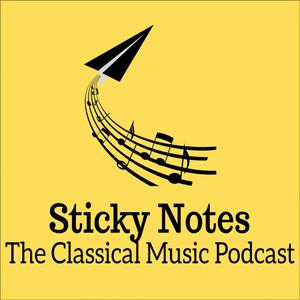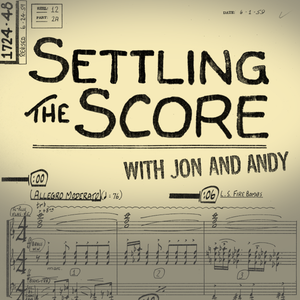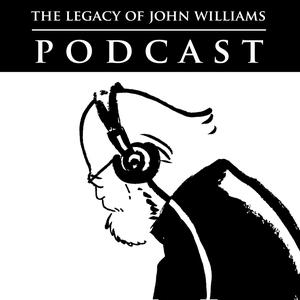
The Baton: A John Williams Musical Journey
Jeff Commings
Host Jeff Commings examines the 100-plus feature films featuring original or adapted music written by the legendary John Williams.
- 47 minutes 2 secondsEpisode 113 - Indiana Jones and the Dial of Destiny
The fifth Indiana Jones movie brought 79-year-old Harrison Ford back into the old fedora for another adventure involving a precious artifact that could spell doom if put into the wrong hands. Along for the ride was 91-year-old John Williams, who completed his 43-year association with Indy with a score that features callbacks to moments from previous Indiana Jones films and a lack of a major theme that had the potential to make the score a major standout. Host Jeff Commings details some of the highlights of the score on this latest episode of The Baton: A John Williams Musical Journey.
12 July 2023, 7:01 am - 8 minutes 46 secondsEpisode 112.5: While You Wait For Episode 113...
Looking for something to pass the time as you wait for episode 113 of The Baton? Since the next John Williams film score won't be released until summer 2023, there won't be a new episode of The Baton until then. But host Jeff Commings has another podcast that can help you fill the time with more Hollywood history.
This show, called The Best Song Podcast, is perfect for fans of Hollywood history, of music history, of movie songs, and movies in general. You'll go on a 92-episode journey through 90 years of the Academy Award for Best Original Song, featuring all the songs nominated for the big award from 1934 to 2023.
Chances are you'll find a new favorite movie song, or learn a bit more about one that is already near to your heart! The show is available on all podcast platforms, and new episodes are released every Monday. Enjoy the show!
14 February 2023, 7:01 am - 55 minutes 40 secondsEpisode 112 - The Fabelmans
Host Jeff Commings is back on The Baton to discuss what might be the final film collaboration between director Steven Spielberg and composer John Williams. The Fabelmans is Spielberg's semiautobiographical film about his family and the beginnings of his career as a filmmaker. Though the film is 200 minutes long, there is only about 30 minutes of original music from John Williams in it. Commings details a couple of the highlight musical cues, including a now-iconic dance scene with Michelle Williams, and what Williams had been doing in the two years since finishing work on The Rise of Skywalker..
22 December 2022, 7:01 am - 1 hour 21 minutesEpisode 111 - Epilogue
This is the final episode of "The Baton: A John Williams Musical Journey," and host Jeff Commings has invited one of the premier analysts of John Williams' music to talk about his extensive catalog for the "Star Wars" and Indiana Jones films. Frank Lehman discusses the genesis of the idea to examine all of the thematic material in both film series, and breaks down two of his favorite themes from the "Star Wars" franchise. It's a fantastic discussion that closes out this extensive podcast series with an over-reaching look at the Maestro's career.
30 December 2020, 7:01 am - 54 minutes 31 secondsEpisode 110 - The Rise of Skywalker
After a mind-boggling span of 42 years, John Williams closed out his involvement with the "Star Wars" film series with the score for "The Rise of Skywalker." Host Jeff Commings and cohost Paulius Eidukas talk about the missteps in director J.J. Abrams' choices visually and musically. The two talk about the four new themes that flow through the score, all four notable because they connect more to a group of people and an idea instead of one person. With the help of Eidukas on the piano, we understand how the new themes connect to previous melodies, and how the finale gave them a "shivers-up-the-spine" feeling with the music. As of this posting, "The Rise of Skywalker" is the final film in the John Williams canon after 60 years of writing the score for 109 films. It is fitting that "The Rise of Skywalker" is the final film in John Williams' career, if the Maestro has indeed retired from film scores.
23 December 2020, 7:01 am - 1 hour 2 minutesEpisode 109 - The Post
In what might be their final film collaboration, Steven Spielberg and John Williams worked together to give us a score for "The Post" that doesn't go full bore with the orchestra, using instead the emotion of electronic pulses and Americana touches to convey the tension of publishing the Pentagon Papers in The Washington Post. Host Jeff Commings and co-host Paul Wright discuss the way Williams perfectly matches "the intended emotional contexts of a scene with music," resulting in an emotion from the viewer that is almost purposeful. Though we could presume that "The Post" is the final John Williams score for a Steven Spielberg film, the Maestro started a new collaboration in 2017 with violinist Anne-Sophie Mutter, writing a concerto for her that was a long time coming.
16 December 2020, 7:01 am - 52 minutes 27 secondsEpisode 108 - The Last Jedi
Rian Johnson took over for J.J. Abrams as director of the second film in the "Star Wars" sequel trilogy, titled "The Last Jedi." Johnson changed the tone and direction of the sequel dramatically, and composer John Williams went along for the ride with a couple of new themes for two new characters whose music only appears in this film, for different reasons. Host Jeff Commings is joined again by Paulius Eidukas for an examination of the use of pre-existing music -- including Leia's theme in the controversial "Leia in Space" scene -- and how certain compositional techniques made Williams' Oscar-nominated score feel bold and a little daring.
9 December 2020, 7:01 am - 59 minutes 49 secondsEpisode 107 - The BFG
Trombone player and music teacher Paul Wright makes his debut appearance on "The Baton" to defend the Steven Spielberg film "The BFG" and discusses with host Jeff Commings the intricate compositional technique John Williams used for this score. From creating virtuosic flute writing to reaching back to past themes to give us a buffoonish motif for the villains, the co-hosts have a blast dissecting this "blip" on John Williams' filmography, a underrated score that has many gems that you will discover in this episode.
2 December 2020, 7:01 am - 58 minutes 25 secondsEpisode 106 - The Force Awakens
When the news broke that Disney would be producing a new trilogy of "Star Wars" films taking place after the events of "Return of the Jedi," the logical choice was to have John Williams return to continue his expansive space opera composition. And he returned with some new themes for "The Force Awakens" that featured a complex motif for the female hero and a theme for the villain that, not surprisingly, had a connection to Vader's theme. Host Jeff Commings is joined by Paulius Eidukas for an examination of Williams' compositional techniques for the new film, and why some music might have a connection to the Harry Potter scores.
25 November 2020, 7:01 am - 1 hour 3 minutesEpisode 105 - The Book Thief
Host Jeff Commings and co-host David Kay discuss the quiet yet personal score for "The Book Thief" in this episode. John Williams lobbied hard to be the composer for this film after reading the book and the script, and Kay believes Williams found a personal and intimate connection to the story at 81 years old. In addition to discussing the themes Williams wrote for Death and the heroine Liesel, the two chat with director Brian Percival about collaborating with John Williams. Percival relives the moment he sat in John Williams' home listening to the Maestro play themes from the score on his piano, and sitting in the middle of the recording studio as Williams conducted the studio orchestra. This is our first opportunity to hear firsthand about the director-composer relationship in this podcast, and we hope you enjoy the episode!
18 November 2020, 7:01 am - 42 minutes 27 secondsEpisode 104 - Lincoln
John Williams only worked on one film score when he turned 80 years old, collaborating once again with Steven Spielberg for "Lincoln." The film marked the 40th year of Spielberg and Williams working together, and it required Spielberg to exercise a lot of restraint in a dialogue-heavy film. Williams also shows some restraint in writing music for the Chicago Symphony Orchestra, providing a noble but slightly fragile theme for the president. Host Jeff Commings also looks into the research Williams did to write music that harkened back to the 1860s, including a main theme for the film that feels like it is adapted from a pre-existing Negro spiritual.
11 November 2020, 7:01 am - More Episodes? Get the App
Your feedback is valuable to us. Should you encounter any bugs, glitches, lack of functionality or other problems, please email us on [email protected] or join Moon.FM Telegram Group where you can talk directly to the dev team who are happy to answer any queries.
 Twenty Thousand Hertz
Twenty Thousand Hertz
 Sticky Notes: The Classical Music Podcast
Sticky Notes: The Classical Music Podcast
 Settling the Score
Settling the Score
 The Legacy of John Williams Podcast
The Legacy of John Williams Podcast
 The Official Gilded Age Podcast
The Official Gilded Age Podcast